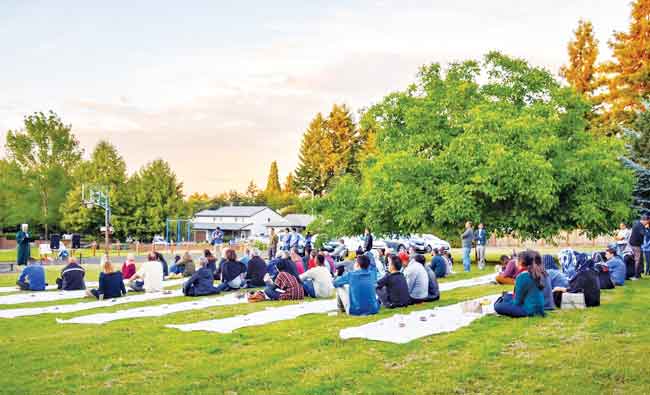Ramadan spent abroad can be special because of how difficult it is

Sat, 2018-05-26 23:43
JEDDAH: As Muslims around the world are fasting, Arab News got some exclusive insights into how Saudi students in particular cope with this while abroad. We found that some students welcome the added burden of being away from family, customary foods and traditions, while others who have gone back to Saudi Arabia noticed a shift in how society embraces the month of Ramadan from a social standpoint.
Nawaf Basrawi, a graduate student at the University of California, Davis, details the struggle of fasting Ramadan while abroad. “Its not the same (fasting in the US). Its more of an individual challenge, living in a city that doesnt know, and frankly, doesnt care. Temptations are not shielded from us and nobody will be reorganizing the day to lessen that burden.
“Its not like Saudi Arabia, where we can hear the adhan for every prayer, working hours are shortened, and we can enjoy all the traditional foods with the added comfort of family and friends.
“All of this is missing when we spend it over here. We have to rely on ourselves to create that warmth and search for the right accommodation as best we can.
“We do have access to a nice Middle Eastern market that imports some traditional foods, but its still difficult. Whats most difficult is managing that void of not having family around.”
Fotoon Al-Rashid, an art senior studying at the University of San Francisco, gave an alternative perspective on how to approach Ramadan while living in a foreign country. Speaking to Arab News by phone, she said: “In some ways, it is like how Ramadan was during the time of the Prophet (peace be upon him) — where we live in a culture where Muslims are a minority and have many wrongful stereotypes attached to them. A Ramadan where life goes on as if it is any other day.
“The working hours dont change, and so we must be up during the day working regular hours, going to classes, and then breaking our fast in the evening, praying, and then going to bed relatively early for work or classes again the next morning. However, Ive learned to welcome this unique struggle of fasting Ramadan in the US.
“Ramadan should be all about solidarity with those that are less fortunate. Those unfortunate ones who are not giving up food and drink by choice, but rather by circumstance. I can understand this and I feel this more living in San Francisco during Ramadan. I have to see homeless people every day who are living their life essentially in an involuntary fasting state. I wouldnt have it any other way.”
While some students embrace the added hardships of being away from home during Ramadan, Saudi student Naif Al-Harthi has quite a different outlook on the contrasts of spending Ramadan in Saudi Arabia as opposed to the US.
Al-Harthi, a business student who has since settled in the US after graduating from Norfolk University, spoke about Ramadan in the Kingdom with a sense of nostalgia, although from his perspective the atmosphere of this holy month in Saudi Arabia is not quite what it used to be. Speaking to Arab News he said: “Last year, I was very much looking forward to spending my first Ramadan in Jeddah, after seven years in Virginia.
“I was surprised to see how disengaged people have become from Ramadan traditions.”
He continued: “When I was a child during the 1990s, people were committed to frequent family visits, but I suppose with the new generation, things have started to change. People started celebrating Ramadan just between themselves, it seemed. Family visits started to become less frequent; even the cooking is not as authentic as how I remember. More common now is families ordering in and catering their iftar and suhoor or going out to restaurants. It took away some of that special warmth of this month for me,” he said.
Fasting during Ramadan while abroad is very unique in the sense that, as with many situations in life, perspective can often be the most important factor in efficiently managing the whole process. After hearing the different Saudi viewpoints, it is seemingly a contrast of comfort and hardship.
The connection that Ramadan should give us with the needy, with those who are suffering without a steady supply of food and drink, that particular experience, can certainly be felt more abroad than in Saudi Arabia for some.
Living in Saudi Arabia, or any other Muslim-majority country for that matter, individuals often get to sleep during the day as their working hours are reduced. In a way, it is easing the whole purpose of that burden of really feeling that solidarity of hunger and thirst with those who are less fortunate. Ramadan spent abroad, in that sense, can be really special precisely because of how difficult it is.
Going to mosques particularly is a beautiful thing. Often in the US, there are only a few in any given city, and so they serve as a magnet for all Muslims in that general area. Seeing people of all nationalities from around the world joining together in prayer is a beautiful thing. Its a true representation of how global Islam really is.
So, taking into consideration the other added burdens of fasting while abroad, for Saudi students with the right perspective, it can lead to just as spiritual an experience, if not more, than fasting in the comfort of their home country.
 Main category: Saudi ArabiaTags: RamadanSaudi ArabiaRamadan 2018 What makes Ramadan in Old Jeddah specialEfforts continue at Prophet's Mosque to serve worshippers during RamadanMo Salah, the face of Ramadan in Cairo
Main category: Saudi ArabiaTags: RamadanSaudi ArabiaRamadan 2018 What makes Ramadan in Old Jeddah specialEfforts continue at Prophet's Mosque to serve worshippers during RamadanMo Salah, the face of Ramadan in Cairo
[contf]
[contfnew]

Arab News
[contfnewc]
[contfnewc]




